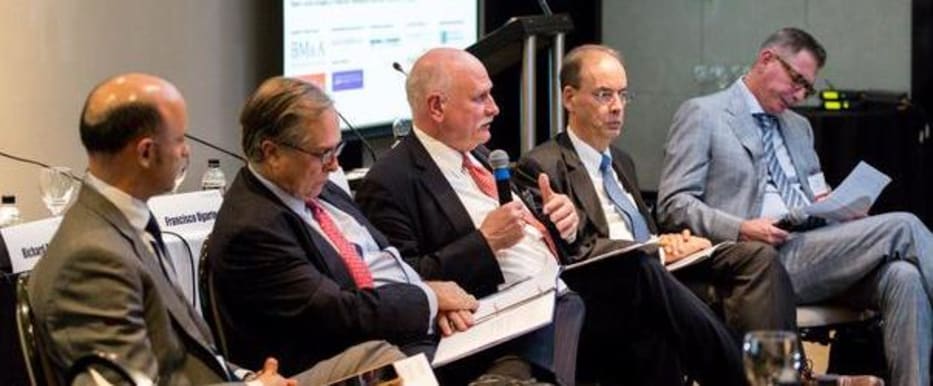Lulu Rumsey
Investor appetite for Latin America won’t be curbed by political and social unrest there, concluded lawyers speaking at a symposium session held at Latin Lawyer’s 5th Annual M&A Conference, held last week in São Paulo.

Violence in Mexico – where drug-related feuds have killed tens of thousands of people in the past seven years – does not majorly affect deal making in the country, while in Chile, concerns over sluggish economic growth have not deterred international investors’ optimistic long-term view of the country. Likewise, in spite of the business community’s disappointment that opposition party candidate Aécio Neves failed to dislodge Dilma Rousseff’s hold on the Brazilian presidency in October, and the ongoing scandal circling state-owned energy company Petrobras, international investor appetite in Latin America’s largest economy remains unaffected and is expected to stay that way through 2015.
The panel was answering questions submitted by conference delegates, which, alongside politics, included questions on fee arrangements and whether lawyers should undertake a brokerage role in deals.
Investor interest sparked by Mexico’s energy reforms, passed at the end of last year and beginning to be implemented now, far outweighs concerns about security there. “In Mexico there is a tremendous level of interest, and although there is caution because of the perception that security issues in certain parts of the country may affect business, there will be a lot of deal flow going forward,” said Allen Miller, who is a partner in Chadbourne & Parke LLP’s New York office.
In Chile, although local companies appear to be more pessimistic about the country’s unremarkable economic growth forecast (with many opting to sell assets held there), the mood has not spread to foreign investors. Local companies were particularly perturbed by the student strikes that took place between 2011 and 2013, prompting many to back out of investment into private education in the country. “Foreign investors have a more long-term view and are still investing,” said Francisco Ugarte of Carey. The overall result is a “yellow light” on M&A activity in the country, thanks to a mix of international interest and a quiet local front.
A cautiously positive outlook also extends to Brazil. “The investor view of Brazil is really mixed: although tax reform is what everyone is really looking for, foreign direct investment was relatively consistent this year with other years and the deal flow is there,” said Richard Aldrich of Skadden, Arps, Slate, Meagher & Flom LLP, who was one of the conference chairs. The appointment of Joaquim Levy as the country’s new finance minister has also buoyed investors’ expectations. “Joaquim Levy has a reputation as a no-nonsense, effective administrator – the question is whether he will have the freedom to be those things in this next term,” added Aldrich.
Moreover, some are finding positives in the Petrobras debacle, viewing the country’s investigation into the allegations as proof that Brazil has the necessary institutional framework needed to tackle corruption. The question many are now asking is whether Brazilian law firms will be able to meet the demands that the Petrobras scandal will place on them, as clients will be under increased pressure to meet standards decreed in the Foreign Corrupt Practices Act, which is something most Brazilian lawyers do not have a huge amount of experience in. Firms will likely need to carry out background checks on transactions far more often than they do now, and pay particular attention to consultancy agreements between companies that carry no apparent economic substance and contracts with companies located in tax havens, explained Carlos Lima of Pinheiro Neto Advogados. Conference chair Paulo Cezar Aragão of Barbosa Müssnich & Aragão concurred: “This is a whole new world for us so we have to be careful – the biggest challenge [for lawyers] will be doing due diligence, deciding what questions should be asked and how they should be asked.”
Turning to fee arrangements, the panel exposed the wide variations in the ways in which law firms across Latin America bill their clients. While some firms charge an hourly rate, others adopt a fixed fee that is usually capped. Others charge a discounted rate that is based on the deal team achieving predetermined milestones in the transaction, with a premium built in depending on a successful result. Firms scouting for new clients is still pushing fees downwards, something the fixed fee approach attempts to rectify. Success fees – where lawyers are paid a premium for obtaining a good result in a transaction – are always worth asking for, said Aldrich. “If you don’t ask, you don’t even have a chance of getting it - if the deal was a great success, having an option that the client pays a success fee at least gets you in the room to have a discussion about it.”
The panel also warned lawyers against going beyond their remit as lawyers and acting as a deal broker by recommending acquisitions to their clients. Although good acquisitions could curry favour with a client, if the deal goes bad – which is more likely to be the case – the backlash could affect the firm’s relationship with its client. “There is very little to gain from doing that and you are risking your relationship with your client,” said Aragão. Ultimately, lawyers need to draw a firm line to delineate where their role in a transaction ends and a broker or banker’s role begins.
The symposium concluded a day that included discussions on Brazilian M&A activity over the last year, Brazilian antitrust authority CADE’s performance, the unique challenges associated with M&As involvingpublic companies and family businesses, and the approach disputes lawyers can take when deals go wrong.
